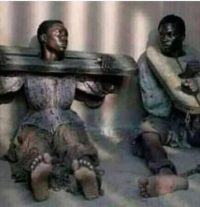The Deep-rooted Challenges Faced by the Black Race: Religion, Colonisation, and Slavery
Religion, colonisation, and slavery have had a profound impact on the Black race, shaping their historical trajectory and presenting ongoing challenges. When Christianity becomes intertwined with capitalism, it creates a complex web that continues to affect the lives of Black individuals to this day. This article delves deeper into the multifaceted consequences of these factors, examining their influence on economic development, education systems, leadership, and the urgent need for change.
Religion, a Dichotomy of Hope and Inequality often provides comfort to those who are in desperate situations, and none more so that the Black race that puts their faith and future in white Jesus and christianity, offering them solace and a sense of purpose. However, when it coexists with capitalism, it can exacerbate existing inequalities. Capitalism tends to favour those with greater resources, allowing them to amass wealth and power at the expense of the marginalised. This combination can create a system where the rich become richer, perpetuating societal divisions.
Colonization have had a lingering Effect, but drawing a comparison between countries that have endured imperial colonisation, such as India and China, reveals distinct paths of recovery and development. Both nations have managed to shed the burdens of colonisation and rebuild their countries and economies over the past fifty years. India, with its population of over one billion, shares a common language and flag, while China, also with a population of over one billion, exhibits similar characteristics. In contrast, Africa, with its vast resources and a population of nearly one billion people, faces significant challenges with diverse languages and fifty-four flags. This complexity hampers efforts toward unity and progress.
Education is A Key factor to Empowerment and Development. China and India’s commitment to investing in education for their populations has been instrumental in their economic growth. The presence of an educated populace has become a driving force behind their development. However, Africa’s education system often falls to the bottom of the priority list, impeding progress. Many children in Africa are unable to attend school due to financial constraints, perpetuating a cycle of poverty and hindering the continent’s advancement.
Materialism, Corruption, is a cancer that most Black leaders sometimes succumb to, reflecting an obsession, promoted through social media. This obsession with possessions, such as cars and mobile phones, has fueled corruption, further corroding and toxifying the economy. Examples of extravagance abound, such as the King of Swaziland purchasing multiple Rolls Royces for his wives or ruling families in resource-rich countries treating national resources as personal domains. These actions undermine social welfare and economic stability.
Considering the challenges faced by the Black race, some propose exploring the idea of diversifying the gene pool through migration from the Indian sub-continent and Latin America. The hope is to infuse a spirit of self-help and enterprise into the community. To bridge the gap between the Black race and the rest of the world, it becomes imperative to prioritise competence, dedication, and education when selecting individuals for political roles. Merit should take precedence over regional or tribal affiliations.
Africa possesses vast amounts of land and resources, yet it struggles to establish lucrative industries like Australia and New Zealand, which excel in meat production and export. Instead, locals often resort to hunting for bush meat, endangering their lives and perpetuating an unsustainable cycle. Calls for African unity resonate strongly, but resistance from present-day leaders, who fear losing their privileges and power, impedes progress. Genuine unity and collaborative efforts are necessary to dismantle the structures that enable billions to be siphoned off to Western banks.









It’s actually very complicated in this busy life to listen news
on Television, thus I only use the web for that reason, and get the most up-to-date news.
If you wish for to grow your know-how only keep visiting this
web page and be updated with the latest news update posted here.
Hey There. I found your blog the use of msn. That is an extremely neatly written article.
I will be sure to bookmark it and come back to read
more of your helpful information. Thank you for the post.
I will definitely return.
I don’t even know the way I ended up right here, however I thought this put up used to be great.
I don’t realize who you are but definitely you’re going to a well-known blogger in the event you are not already.
Cheers!
Howdy! This is my first visit to your blog!
We are a team of volunteers and starting a new initiative in a community in the same niche.
Your blog provided us valuable information to work on. You have done
a outstanding job!
My partner and I stumbled over here from a different page and thought I might as well check things out.
I like what I see so now i am following you. Look forward to exploring your web page again.
Way cool! Some extremely valid points! I appreciate you penning this post and also the
rest of the site is also very good.
I’d like to thank you for the efforts you’ve put in penning
this website. I am hoping to see the same high-grade blog
posts by you in the future as well. In truth, your creative writing abilities has motivated me to get my own,
personal website now 😉
This design is spectacular! You certainly know how to keep
a reader entertained. Between your wit and your videos, I was almost moved to
start my own blog (well, almost…HaHa!) Excellent job.
I really enjoyed what you had to say, and more than that,
how you presented it. Too cool!
I blog quite often and I truly appreciate your information. Your article has really peaked my interest.
I’m going to book mark your website and keep checking for new details about once per week.
I opted in for your RSS feed too.
I don’t even know how I ended up here, but I thought this post was great.
I do not know who you are but definitely you’re going to a famous blogger if you aren’t already 😉
Cheers!
You suggested that really well!
Hi there, its good piece of writing about media
print, we all know media is a wonderful source of data.
Hi there, its pleasant post on the topic of media print, we all
understand media is a enormous source of data.
Hiya! Quick question that’s completely off topic. Do you know how to make your site mobile friendly?
My blog looks weird when viewing from my iphone. I’m trying to find a theme or plugin that might be able to fix this
problem. If you have any suggestions, please share.
Thank you!
This post is genuinely a fastidious one it assists new
web visitors, who are wishing for blogging.
Why visitors still use to read news papers when in this technological globe all is
presented on web?
Great weblog here! Also your web site lots up fast!
What host are you the use of? Can I am getting your affiliate hyperlink for your
host? I want my web site loaded up as quickly as yours lol
What a stuff of un-ambiguity and preserveness of valuable familiarity concerning unexpected emotions.
Thank you for sharing your info. I really appreciate your efforts
and I will be waiting for your next write ups thanks once again.
Wow that was unusual. I just wrote an incredibly long comment but
after I clicked submit my comment didn’t show up.
Grrrr… well I’m not writing all that over again. Anyhow,
just wanted to say great blog!
Whoa! This blog looks exactly like my old one!
It’s on a totally different topic but it has pretty much the
same layout and design. Wonderful choice of colors!
I’ve been exploring for a little for any high-quality articles or weblog posts in this kind of space .
Exploring in Yahoo I ultimately stumbled upon this web site.
Reading this info So i’m satisfied to convey that I’ve a very good uncanny feeling I discovered just what I needed.
I such a lot for sure will make sure to do not disregard this site
and give it a look regularly.
Hi there everyone, it’s my first pay a visit at this web site, and post is actually fruitful designed for me, keep up posting such content.
I read this post fully about the difference of latest and preceding technologies, it’s awesome article.
Wow, superb blog layout! How long have you been blogging for?
you make blogging look easy. The overall look of your site is fantastic, as well
as the content!
I really love your site.. Great colors & theme. Did you make this website yourself?
Please reply back as I’m planning to create my very own site and would love to know where you got this from or
what the theme is named. Appreciate it!
Hmm is anyone else experiencing problems with the images on this blog loading?
I’m trying to determine if its a problem on my end or if it’s the blog.
Any responses would be greatly appreciated.
Today, while I was at work, my sister stole my iPad and tested to see if it can survive a 40 foot drop, just
so she can be a youtube sensation. My iPad is
now broken and she has 83 views. I know this is entirely off
topic but I had to share it with someone!
Simply desire to say your article is as astounding.
The clarity in your post is simply cool and i could assume you’re an expert on this subject.
Well with your permission allow me to grab your feed to keep updated with forthcoming post.
Thanks a million and please carry on the rewarding work.
For most recent news you have to pay a quick visit world wide web
and on internet I found this website as a most excellent site for most up-to-date
updates.
Great blog! Is your theme custom made or did you
download it from somewhere? A design like yours with a few simple
adjustements would really make my blog jump out. Please let me know where you got your theme.
Thanks a lot